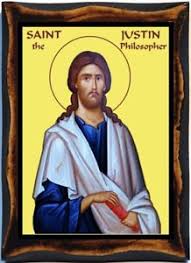HOMILY EASTER SEASON WEEK 07 03 – Year II
Balancing Action and Contemplation:
Memorial of St. Justin Martyr
(Acts 20:28-38; Ps 68;Jn 17:11b-19)
*****************************************
Some see Franciscan Fr. Richard Rohr as a modern-day prophet, whose career spans founding the New Jerusalem charismatic community, recording a ground-breaking Great Themes of Scripture, delving into Male and Female Spirituality, becoming an expert on the Enneagram and finally founding a Center for Action and Contemplation in Albuquerque, New Mexico.
His work contributes to the message from the readings today, the need to balance contemplation and action, prayer and ministry in our lives.
In the readings, Paul and Jesus continue their farewells, like the words of a dying person to whom we should pay close attention.
Paul has a focus on contemplation as source of our ministry, including his conversion paradigm shift and his single-minded focus on prayer. He encourages us to stay alert, watchful, focused on the grace that builds and fulfills. Then we are to move into action and support the poor and weak.
Jesus for his part has a focus on contemplation and relationship as the source of our ministry. He extends an invitation to communion in prayer with him and the Father. He stresses unity and community among the disciples, then sends them into the world as he was sent into the world with John 20:19-23 as a mandate. We now share the mission of Jesus to redeem and sanctify the world. We do that through forgiveness and healing; teaching it and living it in our lives. The result will be growth in the kingdom of God among us: peace, joy and justice of the Holy Spirit.
John had suffered for years working under a racist boss who tried every trick in the book to get him fired, just because he was Indigenous. On the way to a Cursillo weekend (a short course on Christianity), John had second thoughts and headed south to another city instead. Just then the song, “The Old Rugged Cross” came on the radio, and for some reason, John started to cry. The song touched his heart, and he decided to turn back and go to the Cursillo after all. There, he learned all about forgiveness. He thought about his racist boss who for eight years had tried to make life miserable for him and kept looking for a way to fire him. When he got home, he phoned his boss, thanked him for making life miserable for him, and told him he forgave him. His boss was silent and didn’t say a word, but the next Sunday, he was in church for the first time in years.
 The saint we honour today, Justin Martyr, of pagan Greek origin, was born in Sichem, Samaria about the year 100. For a long time, he searched for truth, passing through various schools of traditional Greek philosophy. After being convinced it was impossible for the human person to satisfy the desire for the divine with human strength alone, he converted to Christianity and founded a school in Rome where he initiated his students into this new religion that he considered the one true philosophy.
The saint we honour today, Justin Martyr, of pagan Greek origin, was born in Sichem, Samaria about the year 100. For a long time, he searched for truth, passing through various schools of traditional Greek philosophy. After being convinced it was impossible for the human person to satisfy the desire for the divine with human strength alone, he converted to Christianity and founded a school in Rome where he initiated his students into this new religion that he considered the one true philosophy.
Justin was a persuasive Christian apologist, travelling and teaching widely about Christianity. Denounced to the authorities, Justin and his companions were brought to trial. Court records reveal how they declared themselves Christians, refusing to sacrifice to the gods. Central to Justin’s witness was that the Church was a public reality, not a private club. The Church existed to engage and create public culture. The purpose of the Church was to be seen and heard, as it had a message and a mission that was for everyone, not just for a privileged few. Justin and his companions were condemned to death by Marcus Aurelius, the emperor-philosopher to whom Justin had dedicated an “Apologia,” and martyred about the year 165. Of his writings, two of his “Apologies” survive, as well as a “Dialogue” in which he tells of his conversion.
The Eucharist is our greatest prayer, and an experience of God’s forgiveness and healing power through Jesus. It also mandates us to go out and serve our brothers and sisters everywhere.
So, let us balance contemplation and action in our lives, and be joyful instruments of God’s forgiveness and healing for the world, like St. Justin.



